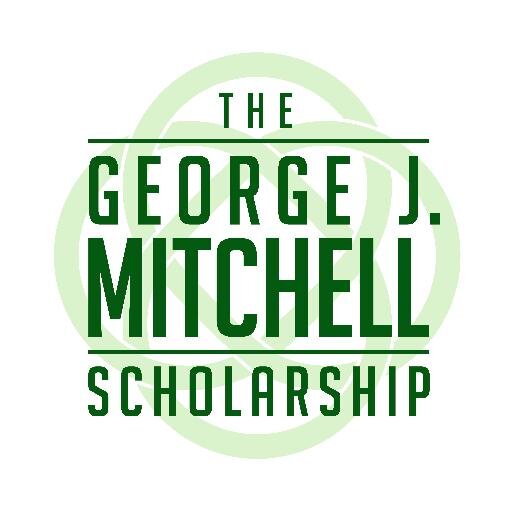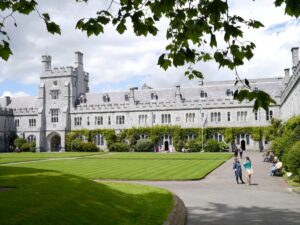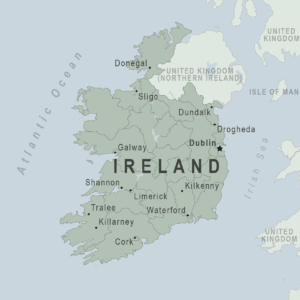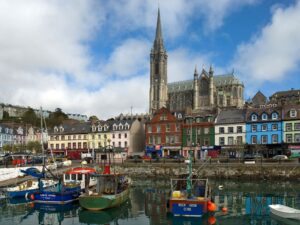Application Form for Awards in 2024-2025
Application Deadline to Wednesday, March 6, 2024
Selection of Scholarship Recipients by Mid-April 2024
The George J. Mitchell Peace Scholarship honors the Northern Ireland peace accord brokered by Senator Mitchell between the governments and peoples of Ireland and the United Kingdom. The accord was reached on Good Friday, April 10, 1998, and accepted by vote of the citizens of Ireland and Northern Ireland on May 22, 1998.
The Peace Scholarship is an agreement between Maine and Ireland for a student exchange at the University level. During the 2024-2025 academic year, students from Maine will be in residence in the city of Cork on the south coast of Ireland, at the University College Cork of the National University of Ireland. The first Peace Scholarship exchanges took place during the 1999-2000 academic year.
For the best chance at winning the scholarship, meet with:
- Erika Clement, Assistant Director of Education Abroad, to discuss the program
- Nives Dalbo-Wheeler, Director of the Office of Major Scholarships, to get assistance with the essay and interview

Eligibility
- Be age 18 or older and be eligible for international travel at the time of the exchange.
- Be a U.S. Citizen.
- Be a Maine resident for at least one year by the application deadline (paying in-state tuition).
- Have demonstrated leadership skills and a commitment to community service.
- Be a full-time, matriculated, undergraduate student at the University of Maine or University of Maine at Machias.
- Have successfully completed 24 credits in residence by the application deadline. AP, early college and transfer credits are not considered.
- Have a cumulative grade point average of 3.0 or higher.
Award Period
Scholarship recipients will participate in the exchange at the University College Cork (UCC) in Cork, on the south coast of Ireland, within one year after receiving the award.
The scholarship covers:
- tuition and fees for a minimum of 12 and maximum of 15 credits per semester (UCC)
- university housing (UCC)
- meal stipend (UCC)
- airfare stipend of $1,000 (funded by UMaine)
Students who are awarded the scholarship will be responsible for:
- additional meal costs
- textbooks at UCC
- international travel and health insurance
- Irish immigration card
- personal expenses
Budget
Estimated budget for a semester as:
University College Cork

The University College Cork (UCC), built around a beautiful stone-faced quadrangle, was founded in 1845, making it one of the oldest universities in Ireland. The university has four colleges: Medicine and Health; Business and Law; Science, Engineering, and Food Science; and Arts, Celtic Studies,and Social Sciences. Over 17,500 undergraduate and postgraduate students take courses in more than 60 different departments. The campus is a combination of early and modern architecture located in a wooded riverside setting close to the city center. The university is a constituent of the National University of Ireland and strongly emphasizes research while maintaining close connections with industry and the local community. University College Cork has been selected as Ireland’s University of the Year by The Sunday Times. The award, for the third time, follows on the heels of UCC becoming the only Irish university to achieve the unique status of Ireland’s first five-star university and improving its position in the QS World University Rankings.
Ireland
Ireland is an island politically divided into two parts: the sovereign Republic of Ireland and Northern Ireland of the United Kingdom. The “Emerald Isle” earns its name from its lush green landscape and mild, changing climate. From coastal mountains, to inner plains, to rocky shores, Ireland’s rich landscape can only be described as picturesque. Ireland has a rich cultural history dating back from the ice age to the Stone Age, to the Bronze Age, the Iron Age, and so on. If history is not your area of interest, there are always sports. Hurling, and football remain the most popular sports among the Irish and fans take their championship games very seriously. Irish poetry is still very popular and dates back to the 6th century. If you are up for an Irish jig, folk music and dance are a widely spread tradition around the island. From castles, to abbeys, to cliffs overlooking the Celtic sea, to rowdy rugby fans and musicians of all sorts, Ireland offers the best of all worlds and will be an experience not soon forgotten.
Cork
Cork, the second largest city in Ireland, is located on the south coast of the island. The city is a busy seaport and the home
of a large number of industries including electronics, pharmaceuticals, brewing, and food processing. Named the European Capital of Culture in 2005, the city was praised by Lonely Planet as one of the top 10 cities in the world to visit; the city boasts international arts, film, and jazz festivals, lively performing arts and a growing artisanal culinary culture of cafes, restaurants, markets, and boutiques. Cork is situated at the head of the inlet of Cork Harbor with the sea just to the south, mountains, hills, and river valleys to the north and east, and the well-known Lakes of Killarney a couple hours to the west.
Areas of Study
Anthropology (Archaeology, Cultural Studies, and Folklore), Art History, Biochemistry, Biology, Botany, Business (Accounting, Finance, Management, Marketing, and MIS), Chemistry, Classical Studies, Computer Science, Earth Science, Economics, Education, Engineering (Bioengineering, Civil, Chemical, Electrical, and Mechanical), English, Environmental Sciences, French, Food Science and Nutrition, Geography, German, History, International Affairs (Asian, Celtic, Chinese, European Studies), Mathematics, Microbiology, Music, Philosophy, Physics, Political Science, Psychology, Social Work, Sociology, Spanish, Theater, and Zoology.
Click here for Areas of Study for US and Non-EU Visiting Students: What Can I Study?
Calendar
Fall
- Early start: arrival mid-August; program mid-August – early September
- Orientation: early September
- Regular Semester dates: early September – mid-December
Spring
- Orientation: early January
- Semester dates: mid-January – mid-May
Additional information at UCC Semester Dates. Click on Visiting US and Non-EU Orientation and Semester Dates.
Academics
UCC offers a large selection of courses across many majors. Exchange/Visiting students have access to a special set of courses designed specifically for them. Students can request access to the regular courses if they meet the prerequisites and the course has available spaces. Browse available courses in the Book of Modules for Visiting Students
Bachelor degrees at UCC are usually completed in three years thus the course levels are different at both institutions:
| UCC Course Level | UM Course Level |
| 100 | 100 and 200 |
| 200 | 300 |
| 300 | 400 |
Students should pay attention to the following designation to determine appropriate courses which are called modules at UCC:
Semester 1 = UM fall semester
Semester 2 = UM spring semester
Full-time enrollment:
30 UCC/ECTS credits each semester = 15 UM credits
Transfer credits:
5 UCC/European Transfer Credit System (ECTS) = 2.5 credit hours at UM
10 UCC/European Transfer Credit System (ECTS) = 5 credit hours at UM
Grading Scale:
| UCC grades | UMaine grades |
| 70 – 100 | A |
| 65 – 69 | A- |
| 60 – 64 | B+ |
| 55 – 59 | B |
| 50 – 54 | B- |
| 40 – 49 | C |
| 0 – 39 | No credit |
Housing
Accommodation is available in campus housing at Victoria Lodge. Public transportation is available outside apartment complexes to and from the city center. The apartments include WiFi, TV, and a fully furnished living area and kitchen. The living space is shared, with 3 to 6 attached bedrooms, occupied by other international and local students.








